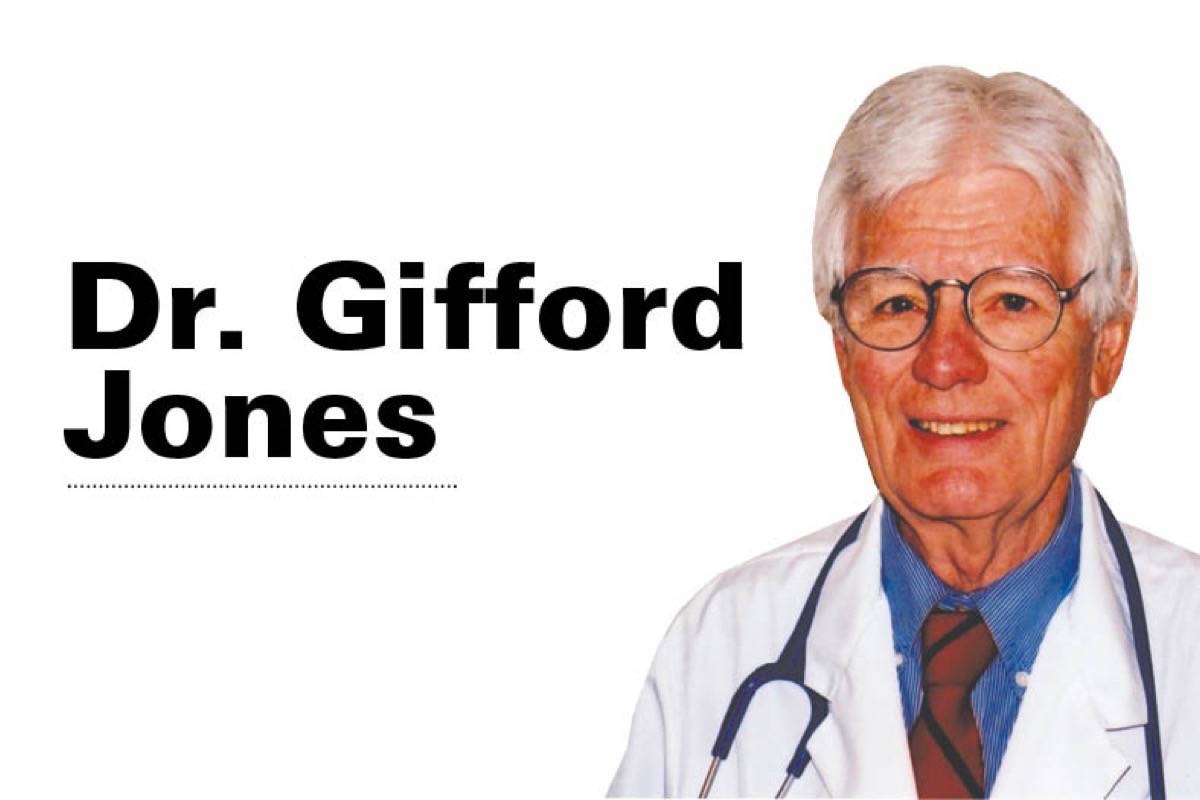For 44 years I’ve been writing this medical column.
It’s been a privilege, but also a huge responsibility. Now, in my 95th year, my time on this planet is limited. Consequently, I’d like to establish The W. Gifford-Jones Prize to honour somebody or something that personifies the importance of common sense, a healthy lifestyle and innovative medical thinking that I have been preaching for years.
Years ago I wrote that, “The problems of society are caused by supposedly intelligent people who are largely fools.”
I haven’t changed my mind as it’s the lack of good sense and faulty lifestyle that are the root cause of many of today’s medical and societal problems.
To emphasize this point I proposed that we could close half the hospitals and fire half the doctors if people stopped abusing themselves and resorted to behaviour beneficial to their bodies.
I admit changing lifestyle is easier said than done. But it’s better than dying unnecessarily at an early age, or suffering for years from chronic diseases that need not happen.
For decades, the feedback that I have received from readers has been supportive.
Their recurring message is that they like the common sense approach to medicine and life in general, and that I call a spade a spade when writing about controversial issues.
Taking a firm stance on vital and controversial issues does not always win a popularity contest.
But as one editor advised me years ago, “It’s the job of a medical journalist to make people think.”
And in so doing, make this world a healthier one.
I’m often asked what it’s like to write this medical column. The best reply is that it’s been the best and worst of times.
The first challenge was fighting for women’s reproductive rights. It’s my belief that every child should be a wanted child. Only after lengthy debate did abortion become legal. But the fight to reaffirm the law continues.
This dispute was followed by battling for better pain control.
I knew that, in England, heroin had been available for over 90 years to ease the agony of terminal cancer pain. I considered this a humanitarian cause and wrote a New Year’s resolution column pleading for its legalization.
In all the years of writing, I had never received a greater response from readers, many of whom had seen a loved one dying in agony. I ended up delivering 40,000 letters of support to the Minister of Health in Ottawa.
But what I thought would be a logical battle was opposed by the Canadian Cancer Society which labelled me a, “Headline seeking medical journalist.”
Some cancer specialists lied when they claimed morphine was as good as heroin in most cases.
But suppose you were not one of those ‘most cases’!’
Later I travelled to England, did my own research and proved all the critics were wrong.
Heroin, after a five year battle, was legalized in February, 1982, to fight terminal cancer pain.
Now in 2019, thousands of North Americans are dying from an overdose of opioid and illegal drugs. I have written that I believe establishing safe injection sites for addicts is the wrong way to fight this epidemic. And that bringing back capital punishment for those pushing illegal drugs is the better route. The majority of readers agree with me.
I also hope The Gifford-Jones Prize will inspire others to seek innovative solutions to other vital problems as the world has never been free of them.
What are the criteria for winning The W. Gifford-Jones Prize, a medallion and a financial award?
For years I’ve written that rule number one was to lead a good lifestyle starting early in life.
Rule number two, never forget rule number one.
And since I write an unconventional medical column, I hope that future prize winners will also find interesting unconventional ways to win this prize.
Maybe a good deed. Maybe medical research. The reward will simply say, ‘For Service to Humanity’.
Next week the first winner will surprise you.
Any regrets? You bet. I wish I had another 60 years to write this column.
The new web site, docgiff.com, starts Jan. 23rd.
I’d appreciate your comments at info@docgiff.com.



